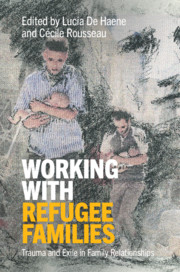Book contents
- Working with Refugee Families
- Working with Refugee Families
- Copyright page
- Dedication
- Contents
- Contributors
- Foreword
- Acknowledgments
- Introduction
- Part I Refugee Family Relationships
- Part II Trauma Care for Refugee Families
- Chapter 7 Mobilizing Resources in Multifamily Groups
- Chapter 8 Working through Trauma and Restoring Security in Refugee Parent-Child Relationships
- Chapter 9 Trauma Narration in Family Therapy with Refugees
- Chapter 10 Exile and Belonging
- Chapter 11 Working with Spirituality in Refugee Care
- Chapter 12 Collaborating with Refugee Families on Dynamics of Intra-family Violence
- Chapter 13 Supporting Refugee Family Reunification in Exile
- Chapter 14 Diagnosis as Advocacy
- Chapter 15 Reflexivity in the Everyday Lives and Work of Refugees and Therapists
- Part III Intersectoral Psychosocial Interventions in Working with Refugee Families
- Conclusion
- Index
- References
Chapter 14 - Diagnosis as Advocacy
Medico-Legal Reports in Refugee Family Care
from Part II - Trauma Care for Refugee Families
Published online by Cambridge University Press: 21 August 2020
- Working with Refugee Families
- Working with Refugee Families
- Copyright page
- Dedication
- Contents
- Contributors
- Foreword
- Acknowledgments
- Introduction
- Part I Refugee Family Relationships
- Part II Trauma Care for Refugee Families
- Chapter 7 Mobilizing Resources in Multifamily Groups
- Chapter 8 Working through Trauma and Restoring Security in Refugee Parent-Child Relationships
- Chapter 9 Trauma Narration in Family Therapy with Refugees
- Chapter 10 Exile and Belonging
- Chapter 11 Working with Spirituality in Refugee Care
- Chapter 12 Collaborating with Refugee Families on Dynamics of Intra-family Violence
- Chapter 13 Supporting Refugee Family Reunification in Exile
- Chapter 14 Diagnosis as Advocacy
- Chapter 15 Reflexivity in the Everyday Lives and Work of Refugees and Therapists
- Part III Intersectoral Psychosocial Interventions in Working with Refugee Families
- Conclusion
- Index
- References
Summary
Considerations around the dynamics of medicalization and social suffering are at the heart of working with refugees, as is attention to and advocacy for families’ social and settlement needs. In this chapter, the authors describe one particular form of advocacy: the generation of medico-legal reports to accompany asylum claims. The authors argue that the increasing medicalization of the refugee experience has led to widespread dissemination of this practice, and suggest that leveraging psychiatric language in a medico-legal report is not without risk to children and families. They cite the emergence of a significant culture-bound syndrome in Sweden, Uppgivenhetssyndrom, felt to be partly related to the language applied by advocating physicians. The United States of America’s recent policy of forcibly separating migrant families has also seen physician activists discuss “toxic stress” and warn of future pathology. The authors discuss the complexity of using psychiatric language for advocacy and suggest some ways of mitigating negative impacts on families. They suggest that physicians consider moving beyond the clinical encounter to advocate for refugee rights on a broader scale.
Keywords
- Type
- Chapter
- Information
- Working with Refugee FamiliesTrauma and Exile in Family Relationships, pp. 232 - 248Publisher: Cambridge University PressPrint publication year: 2020



